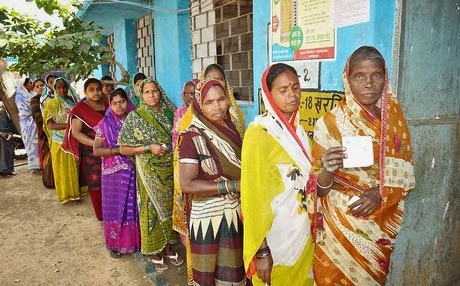By PTI - NEW DELHI Published: 31st January 2014 09:25 PM
Last Updated: 31st January 2014 09:56 PM
"Trust of voters should be sought only on those promises
which are possible to be fulfilled," the EC order said. (PTI photo)
Political parties will avoid making promises which are likely to vitiate the purity of election process and will have to spell out the rationale of promises made and the means of financing them in their manifestos, the Election Commission has said.
In the draft guidelines for election manifestos issued by the EC today in the wake of Supreme Court directions to it, the parties and contesting candidates will be allowed to make only such welfare promises in their manifestos that are enshrined in the Directive Principles of State Policy of the Constitution.
"The election manifesto shall not contain anything repugnant to the ideals and principles enshrined in the Constitution and further that it shall be consistent with the letter and spirit of other provisions of Model Code of Conduct," the EC said in its guidelines to check parties from announcing freebies as part of their manifestos.
In the interest of transparency, level playing field and credibility of promises, the poll body expects that manifestos reflect the rationale for the promises and the ways and means to meet the financial requirements for it.
"Trust of voters should be sought only on those promises which are possible to be fulfilled," the EC order said.
The draft guidelines will be finalised and formally incorporated in the Model Code of Conduct after comments/suggestions from all political parties. The EC has asked all national and state parties to send their reactions to it by February 7.
Majority of the parties had earlier objected to the EC's intervention in putting checks on election manifestos and the promises made by them.
"While the Commission agrees in principle with the point of view that framing of manifestos is the right of the political parties, it cannot overlook the undesirable impact of some of the promises and offers on the conduct of free and fair elections and maintaining level playing field for all political parties and candidates," the EC said.
Source: The New Indian Express
Last Updated: 31st January 2014 09:56 PM
"Trust of voters should be sought only on those promises
which are possible to be fulfilled," the EC order said. (PTI photo)
Political parties will avoid making promises which are likely to vitiate the purity of election process and will have to spell out the rationale of promises made and the means of financing them in their manifestos, the Election Commission has said.
In the draft guidelines for election manifestos issued by the EC today in the wake of Supreme Court directions to it, the parties and contesting candidates will be allowed to make only such welfare promises in their manifestos that are enshrined in the Directive Principles of State Policy of the Constitution.
"The election manifesto shall not contain anything repugnant to the ideals and principles enshrined in the Constitution and further that it shall be consistent with the letter and spirit of other provisions of Model Code of Conduct," the EC said in its guidelines to check parties from announcing freebies as part of their manifestos.
In the interest of transparency, level playing field and credibility of promises, the poll body expects that manifestos reflect the rationale for the promises and the ways and means to meet the financial requirements for it.
"Trust of voters should be sought only on those promises which are possible to be fulfilled," the EC order said.
The draft guidelines will be finalised and formally incorporated in the Model Code of Conduct after comments/suggestions from all political parties. The EC has asked all national and state parties to send their reactions to it by February 7.
Majority of the parties had earlier objected to the EC's intervention in putting checks on election manifestos and the promises made by them.
"While the Commission agrees in principle with the point of view that framing of manifestos is the right of the political parties, it cannot overlook the undesirable impact of some of the promises and offers on the conduct of free and fair elections and maintaining level playing field for all political parties and candidates," the EC said.
Source: The New Indian Express






